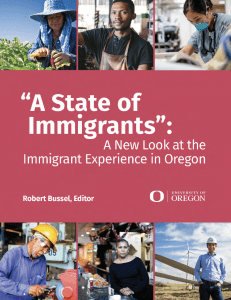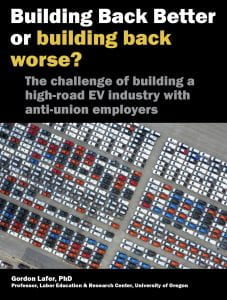A State of Immigrants
 LERC announces the release of a new report: “A State of Immigrants”: A New Look at the Immigrant Experience in Oregon. The book was edited by LERC Director, Bob Bussel and produced by LERC Staff.
LERC announces the release of a new report: “A State of Immigrants”: A New Look at the Immigrant Experience in Oregon. The book was edited by LERC Director, Bob Bussel and produced by LERC Staff.
The politics of immigration in Oregon has continued to evolve in the direction of creating a more welcoming environment for immigrants and refugees. Written by scholars from Oregon’s three major research universities (University of Oregon, Oregon State University, and Portland State University, the report documents the many contributions (economic, social, civic, cultural, political) that immigrants and refugees are making in Oregon’s workplaces and communities, identifies the challenges immigrants and refugees face in adapting to their new environment, and highlights the efforts by immigrants and community-based institutions to help newcomers become acclimated and achieve a greater sense of acceptance and belonging.
With increasing public awareness about the critical role immigrants have played as essential workers during COVID-19 and growing concern about systemic inequality, this research is especially relevant and timely. It offers analysis of a state grappling with the legacy of its often exclusionary past and its attempts to embrace the possibilities of an inclusionary future.
Labor Law Reform Is Critical to the Future of the Auto Industry
New report from University of Oregon’s Labor Education and Research Center shows the auto industry – long a backbone of the middle class – at a critical turning point.
The auto industry is the country’s single largest manufacturing sector – with nearly one million jobs across the country – and for nearly 100 years it has been a critical backbone of the middle class.
In the next ten years, this industry is poised to make a dramatic transition, from gasoline-powered to electric vehicles. The critical question for policy makers and employees alike is what quality of jobs the new industry will provide.
 In Building Back Better or Building Back Worse: The challenge of building a high-road EV industry with antiunion employers, University of Oregon LERC professor Gordon Lafer finds that one of the most critical factors that will determine the quality of EV manufacturing jobs is whether employees will have the right to organize labor unions without fear or intimidation. As Lafer shows, the recent track record of non-union auto employers has included contracting with “union avoidance” consultants who run scorched-earth campaigns that – relying on a combination of legal and illegal tactics – subject employees to a series of threats, intimidation, and personal reprisals designed to stop employees from exercising their right to collective bargaining. These campaigns violate the fundamental norms of American democracy, and subject American workers to the type of elections we normally expect only in rogue regimes abroad.
In Building Back Better or Building Back Worse: The challenge of building a high-road EV industry with antiunion employers, University of Oregon LERC professor Gordon Lafer finds that one of the most critical factors that will determine the quality of EV manufacturing jobs is whether employees will have the right to organize labor unions without fear or intimidation. As Lafer shows, the recent track record of non-union auto employers has included contracting with “union avoidance” consultants who run scorched-earth campaigns that – relying on a combination of legal and illegal tactics – subject employees to a series of threats, intimidation, and personal reprisals designed to stop employees from exercising their right to collective bargaining. These campaigns violate the fundamental norms of American democracy, and subject American workers to the type of elections we normally expect only in rogue regimes abroad.
As the country is poised on the brink of a dramatic transformation in this industry, and as the federal government is preparing to invest many billions of dollars supporting that transition, Lafer’s report shows that if policy makers want auto manufacturing to continue as a source of family-wage jobs, they must insure that the emerging industry guarantees employees’ right to organize unions and engage in collective bargaining free from fear or threats to their livelihoods.
Download the report’s Executive Summary.
Download the full report here.

